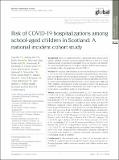Risk of COVID-19 hospitalizations among school-aged children in Scotland : a national incident cohort study
Abstract
Background There is considerable policy, clinical and public interest about whether children should be vaccinated against SARS-CoV-2 and, if so, which children should be prioritised (particularly if vaccine resources are limited). To inform such deliberations, we sought to identify children and young people at highest risk of hospitalization from COVID-19. Methods We used the Early Pandemic Evaluation and Enhanced Surveillance of COVID-19 (EAVE II) platform to undertake a national incident cohort analysis to investigate the risk of hospitalization among 5-17 years old living in Scotland in risk groups defined by the living risk prediction algorithm (QCOVID). A Cox proportional hazard model was used to derive hazard ratios (HR) and 95% confidence intervals (CIs) for the association between risk groups and COVID-19 hospital admission. Adjustments were made for age, sex, socioeconomic status, co-morbidity, and prior hospitalization. Results Between March 1, 2020 and November 22, 2021, there were 146 183 (19.4% of all 752 867 children in Scotland) polymerase chain reaction (PCR) confirmed SARS-CoV-2 infections among 5-17 years old. Of those with confirmed infection, 973 (0.7%) were admitted to hospital with COVID-19. The rate of COVID-19 hospitalization was higher in those within each QCOVID risk group compared to those without the condition. Similar results were found in age stratified analyses (5-11 and 12-17 years old). Risk groups associated with an increased risk of COVID-19 hospital admission, included (adjusted HR, 95% CIs): sickle cell disease 14.35 (8.48-24.28), chronic kidney disease 11.34 (4.61-27.87), blood cancer 6.32 (3.24-12.35), rare pulmonary diseases 5.04 (2.58-9.86), type 2 diabetes 3.04 (1.34-6.92), epilepsy 2.54 (1.69-3.81), type 1 diabetes 2.48 (1.47-4.16), Down syndrome 2.45 (0.96-6.25), cerebral palsy 2.37 (1.26-4.47), severe mental illness 1.43 (0.63-3.24), fracture 1.41 (1.02-1.95), congenital heart disease 1.35 (0.82-2.23), asthma 1.28 (1.06-1.55), and learning disability (excluding Down syndrome) 1.08 (0.82-1.42), when compared to those without these conditions. Although our Cox models were adjusted for a number of potential confounders, residual confounding remains a possibility. Conclusions In this national study, we observed an increased risk of COVID-19 hospital admissions among school-aged children with specific underlying long-term health conditions compared with children without these conditions.
Citation
Shi , T , Pan , J , Moore , E , Katikireddi , S V , Docherty , A B , Fenton , L , McCowan , C , Agrawal , U , Kerr , S , Shah , S A , Stock , S J , Simpson , C , Robertson , C , Sheikh , A & Public Health Scotland and the EAVE II Collaborators 2022 , ' Risk of COVID-19 hospitalizations among school-aged children in Scotland : a national incident cohort study ' , Journal of Global Health , vol. 12 , 05044 . https://doi.org/10.7189/jogh.12.05044
Publication
Journal of Global Health
Status
Peer reviewed
ISSN
2047-2986Type
Journal article
Description
Funding: EAVE II is funded by the Medical Research Council (MR/R008345/1) with the support of BREATHE - The Health Data Research Hub for Respiratory Health [MC_PC_19004], which is funded through the UK Research and Innovation Industrial Strategy Challenge Fund and delivered through Health Data Research UK. Additional support has been provided through Public Health Scotland and Scottish Government DG Health and Social Care and the Data and Connectivity National Core Study, led by Health Data Research UK in partnership with the Office for National Statistics and funded by UK Research and Innovation. SVK acknowledges funding from a NRS Senior Clinical Fellowship (SCAF/15/02), the Medical Research Council (MC_UU_00022/2) and the Scottish Government Chief Scientist Office (SPHSU17).Collections
Items in the St Andrews Research Repository are protected by copyright, with all rights reserved, unless otherwise indicated.

